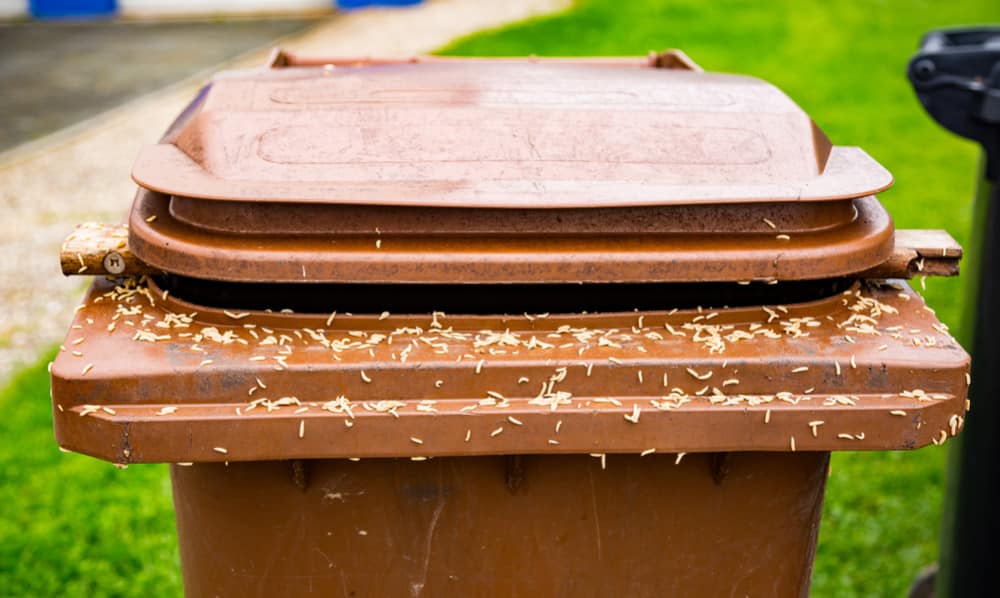Garbage cans are the framework for the proliferation par excellence of maggots. These small white grubs from the laying of flies feed on decaying organic matter. In hot weather, they can quickly invade your garbage dump and become harmful.
Once the reason for their presence is identified, you can then eradicate them and even prevent their appearance with effective tricks.
Why are maggots attracted to garbage cans?
If maggots are particularly attracted to garbage cans, it is above all because they find an environment favorable to their growth and multiplication. Indeed, maggots are larvae resulting from the hatching of eggs laid by insectsof the diptera class, including flies.
For the latter, always on the lookout for odors, confined areas, whether humid or hot, are an ideal setting for reproduction. This is how indoor and outdoor garbage cans are stormed by flies to lay eggs.
In addition, the presence of organic waste during fermentation or putrefaction in the garbage box makes it a food source for these worms. Once these perfectly living conditions are created, the eggs will take between 8 a.m. and 8 p.m. to hatch and give way to maggots. This relatively short reproduction time justifies the rapid invasion of garbage cans.
To put it simply, non-waterproof and not regularly emptied garbage cans will attract flies and promote the birth of maggots. But how to deal with it when they are already there?
Get rid of them quickly
Despite the use of waterproof garbage bags and airtight garbage cans,it is not uncommon to notice the presence of maggots. To eradicate them permanently from the garbage, certain measures are necessary.
Empty the trash can
The first solution to get rid of maggots will be to empty your trashcan. The first step will be to remove the garbage bag, whether full or not, and throw it in the outdoor public container or in a dump. If you subscribe to a garbage collection facility,place the emptied garbage in a garbage bag and set it aside for collection by the appropriate agents.
You will have access to the bottom of the bin to apply a cleaning.
Clean the trash can
For deep cleaning,use boiling water mixed with a little bleach. The maggots present in the trash can will thus be exterminated, because they do not resist boiling water. For an eco-friendly alternative, prefer the use of soda crystals for cleaning.
Once theextermination insects is successful, it will require a thorough rinse with clear water. The goal here is to completely eliminate the corpses of maggots in order to prevent your trash can from getting infected again. Ideally, make sure your trash can is fully dried before a new use.
If the idea of contact with maggots puts you off, use a Z decontaminationstructure or take precautions to avoid them.
Controlling maggots in compost
If you garden, you certainly recycle your household waste to produce compost, a 100% ecological natural fertilizer for your flowers. But because of the exposure, the weather conditions and the sugar content of your waste, your compost can very quickly be infested with maggots.
To prevent the appearance of these, limit sweet waste and avoid leaving your composter in the sun continuously especially in summer. Contrary to popular belief, too much heat is not conducive to composting. To avoid excessive maceration of waste, place the composter in a relatively cool space.
Preferably, your compost bin should be covered. This will prevent flies from laying eggs there to give life to maggots. Regularly ensure that the mixture is kept at the right temperature by aerating it and adding new organic waste.
As a precaution, do not add leftovers or rotten waste to the compost and regularly clean the inner walls and lid. Thus, you will also avoid the appearance of silverfish in your compost.
Protecting against maggots in waste
Since prevention is always better than cure, the use of certain tricks will prevent contamination of waste by maggots. This will include using certain leaves and essential oils as repellents to keep flies, midges and other diptera away.
For example, you can coat the walls of the trash can with mint essential oil that is particularly effective in repelling parasites. Alternatively, use bay leaves oreucalyptus that you can grind and spread on the surface of garbage or around the garbage can. It is also possible to spray vinegar on the garbage bag before use.
To dispose of leftover meat and fish, enclose them in plastic bags or waterproof boxes before placing them in the trash.








Recent Comments